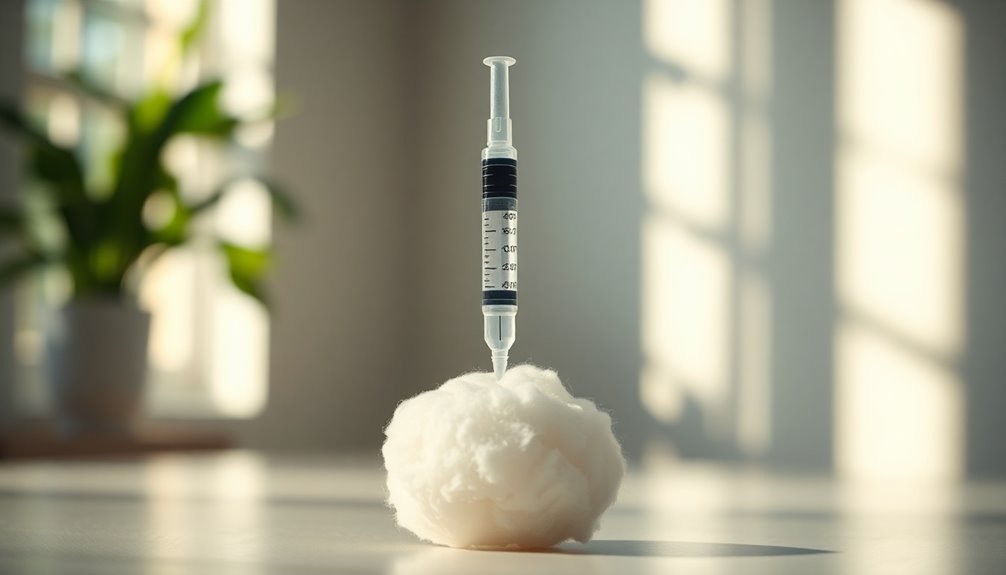Before having blood tests, you need to know their importance. Blood tests can uncover hidden health issues, helping you catch problems early. Fasting for 8 to 12 hours is often required, guaranteeing accurate results. Common tests that require fasting include glucose and lipid panels. Lifestyle factors like alcohol consumption, exercise, and medications can impact results, too. To guarantee you're fully prepared, consider what else you'll need to know about the process and its implications.
Key Takeaways
- Ensure you understand fasting requirements, as many blood tests require abstaining from food and drink for 8 to 12 hours for accurate results.
- Inform your healthcare provider about any medications or lifestyle factors, such as alcohol consumption and exercise, that could affect test outcomes.
- Schedule routine blood tests to monitor your health, detect diseases early, and enable timely adjustments to treatment if necessary.
- Build a strong relationship with your healthcare provider to facilitate open discussions about your health needs and concerns regarding blood tests.
- Be aware that illness can impact blood test results, particularly white blood cell counts, affecting the interpretation of your health status.
Importance of Blood Tests

When you consider your health, blood tests are essential tools that can provide invaluable insights into your body's functioning. They help evaluate organ function, detect diseases, and monitor health conditions effectively.
By identifying risk factors for serious issues like heart disease, blood tests allow for early intervention and better management of your overall health. Regular testing can reveal potential health problems that mightn't show obvious symptoms, promoting proactive healthcare.
Additionally, blood tests are vital for tracking how well prescribed medications work, ensuring you receive ideal treatment outcomes. They also assess blood clotting capabilities, aiding in diagnosing bleeding disorders and guiding surgical decisions.
Purpose of Fasting for Blood Work
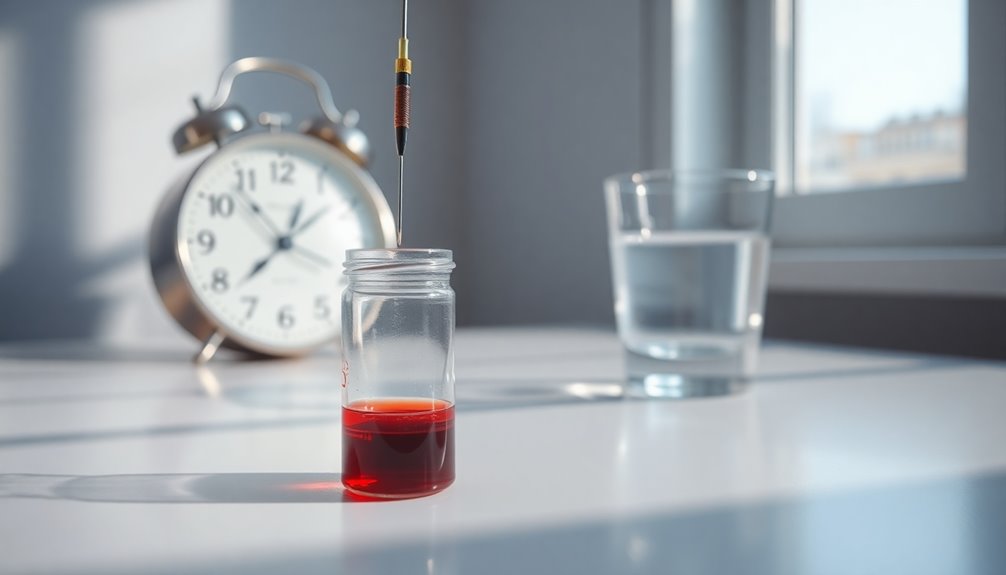
Fasting before blood work is essential because it helps guarantee that the results accurately reflect your body's state.
By abstaining from food and drink for a fasting duration of 8 to 12 hours, you confirm that substances like glucose and cholesterol levels are measured without interference from recent meals.
Abstaining from food and drink for 8 to 12 hours ensures accurate measurement of glucose and cholesterol levels, free from recent meal interference.
This clear baseline is fundamental for accurate blood test results, as food intake can skew your readings, leading to misleading interpretations.
Following your healthcare provider's guidelines on fasting is critical for obtaining valid test outcomes.
Remember, fasting not only aids in evaluating metabolic function but also helps assess your organ health effectively.
Common Blood Tests Requiring Fasting
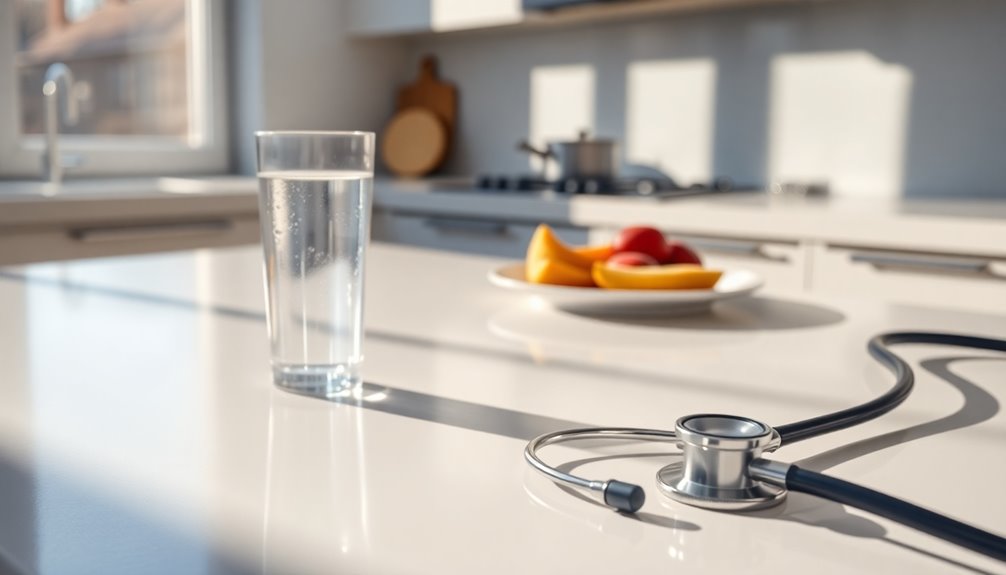
Certain blood tests specifically require fasting to guarantee accurate results. For instance, glucose tests, which measure your fasting blood sugar levels, are important for diagnosing diabetes.
A lipid panel is another key test that assesses cholesterol and triglyceride levels, significant for evaluating heart health. Typically, fasting for 8 to 12 hours before these tests guarantees a clear baseline reading in your bloodstream.
Additionally, basic metabolic panels (BMP) are used to evaluate kidney function, and they may also require fasting.
It's always best to consult with your healthcare provider to confirm the fasting requirements for your specific tests, as some may have unique instructions that differ from general guidelines. Proper preparation is essential for accurate and meaningful results.
Hydration and Blood Tests
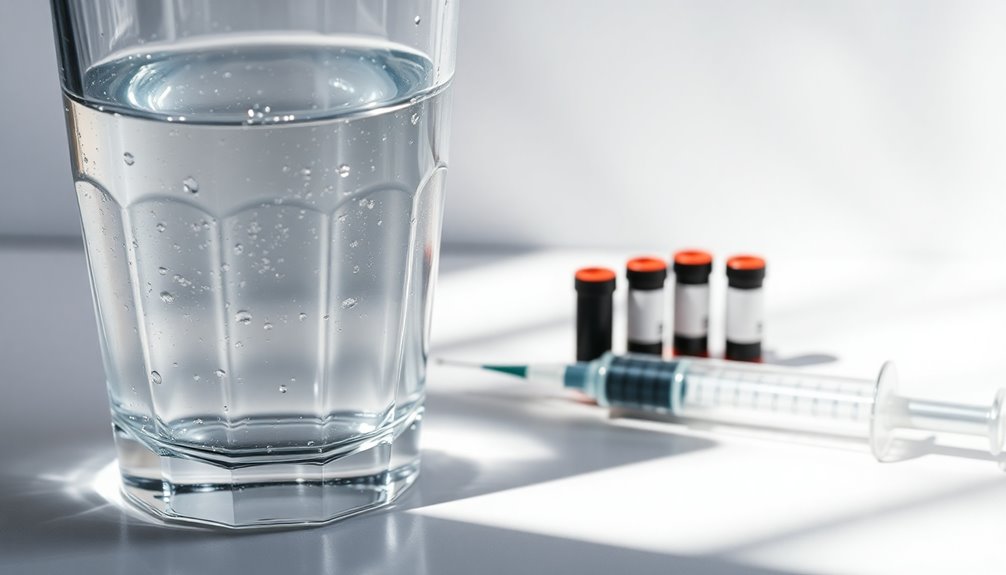
Proper hydration plays an essential role in preparing for blood tests, as it helps maintain blood concentration and makes the blood draw easier. Staying hydrated, primarily through drinking water, plumps your veins, making it simpler for the phlebotomist to locate them.
This not only reduces discomfort but also helps prevent drops in blood pressure during the blood draw. If you're undergoing a fasting blood test, remember that while water is usually permitted, you should avoid flavored waters and sugary drinks, as they might interfere with your results.
Always confirm with your healthcare provider about any specific instructions regarding fluid intake before your test to guarantee the most accurate results. Your hydration can greatly impact your overall experience and the reliability of the test.
Lifestyle Factors Impacting Results

When preparing for a blood test, it's important to take into account how your lifestyle choices can influence the results. Here are some factors you should consider:
- Fasting: Make certain to fast before your blood test as directed; this helps guarantee accurate readings.
- Alcohol Consumption: Limit alcohol consumption beforehand, as it can skew liver enzyme levels and affect test accuracy.
- Strenuous Exercise and Smoking: Avoid strenuous exercise and smoking before your test, since both can alter cholesterol and inflammatory markers.
Additionally, inform your healthcare provider about any medications you're taking, as they may interfere with results.
If you're feeling unwell or have an illness, it might also impact your white blood cell counts and complicate the interpretation of your results.
How to Cope With Nervousness
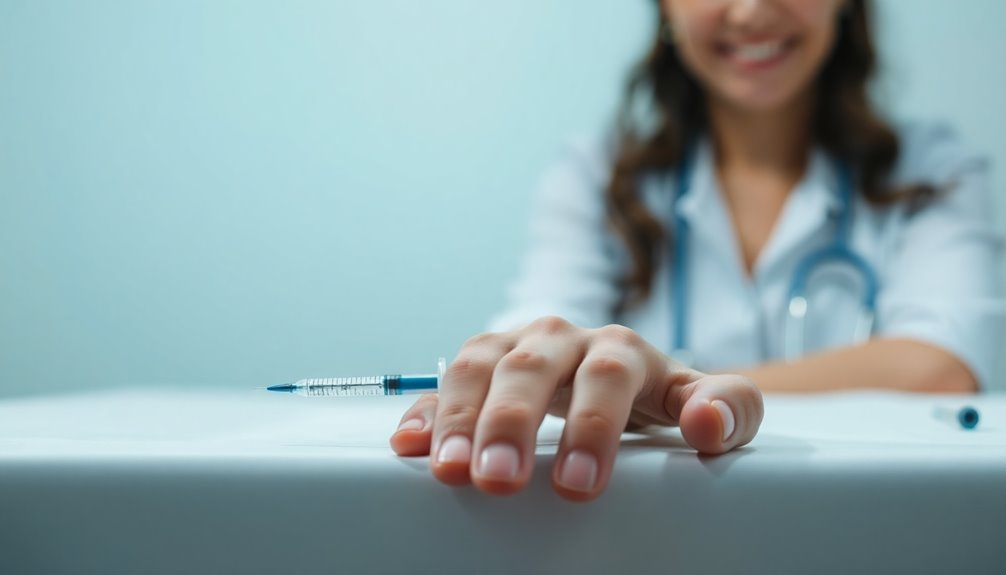
Feeling nervous before a blood test is completely normal, but there are effective ways to manage that anxiety.
Start by informing your technician about your nervousness; they can offer comfort options or techniques tailored to you. Focus on an object in the room or engage in conversation for distraction, minimizing stress during the blood draw.
Listening to calming music through earbuds can also provide a soothing escape, helping you relax. Practice deep breathing exercises before and during the procedure to keep your heart rate steady.
Finally, avoid looking at the needle or the blood draw process; this simple technique can greatly reduce your anxiety and make the experience feel less intimidating.
Pre-Test Preparation Tips
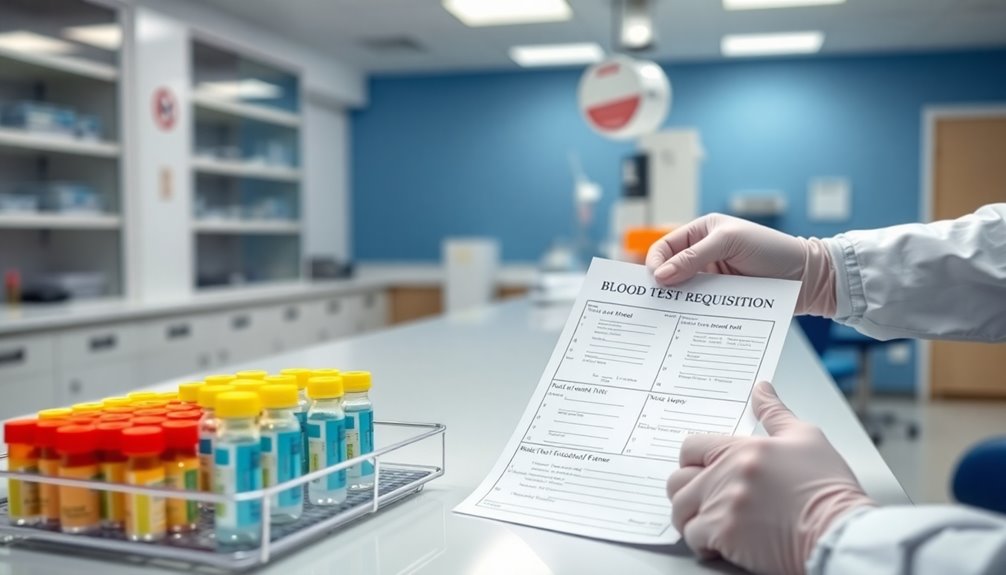
Preparing for a blood test can greatly influence the accuracy of your results, so it's essential to follow a few key steps. Here's how to get ready:
Proper preparation for a blood test is crucial for accurate results, so follow essential steps to get ready.
- Adhere to Fasting Requirements: Make sure you fast for 8 to 12 hours before tests like glucose and lipid panels to avoid skewed results.
- Stay Hydrated: Drink plenty of water beforehand. Proper hydration helps plump your veins, making the blood draw easier.
- Avoid Alcohol and Strenuous Activity: Stay away from alcohol, smoking, and intense exercise for at least 24 hours prior. These can interfere with your blood test results.
Also, confirm any medication restrictions with your healthcare provider, as some medications might need to be paused before testing.
Post-Test Guidelines
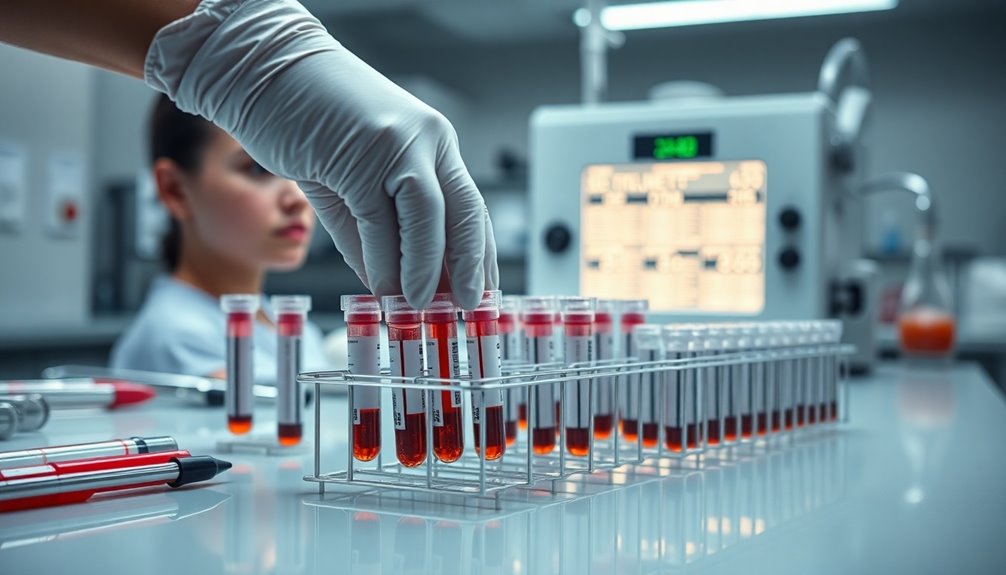
Once your blood test is complete, you can immediately resume eating and drinking, so consider having some snacks or a drink handy to refuel. Here are some fundamental post-test guidelines:
| Action | Details | Notes |
|---|---|---|
| Resume Eating & Drinking | Bring snacks or drinks for hydration and energy | Check with your healthcare provider about fasting needs |
| Monitor Your Feelings | If you feel dizzy or lightheaded, sit or lie down | Wait until you feel stable |
| Follow Up on Test Results | Always discuss results with your healthcare provider | Ask questions about health implications |
| Keep a Record | Document your blood test results for future reference | Helps track changes over time |
| Stay Hydrated | Maintain proper hydration after your test | Crucial for overall health |
Following these guidelines will guarantee a smooth recovery post-test!
Routine Testing Recommendations
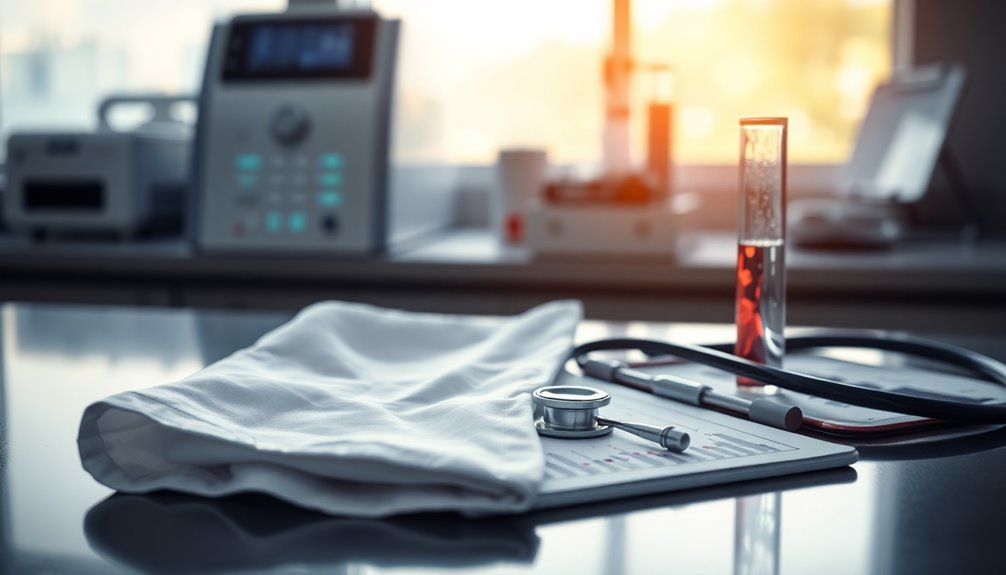
Regular blood tests are essential for keeping your health in check, as they can uncover issues you mightn't even notice.
By establishing a relationship with a primary care provider, you can guarantee you receive the necessary monitoring and testing.
These routine check-ups can help you catch potential health risks early and make informed lifestyle changes for a healthier future.
Importance of Regular Testing
While you might feel healthy, incorporating routine blood tests into your healthcare regimen is essential for uncovering potential health issues early on.
Regular blood tests play a significant role in monitoring your health and can lead to improved health outcomes.
Here are three key reasons to prioritize testing:
- Early Detection: Identify underlying health issues before they escalate into serious conditions.
- Chronic Disease Risk: Regular testing helps pinpoint risk factors for chronic diseases like heart disease and diabetes.
- Medication Insights: Monitor how well your medications are working, allowing for timely treatment adjustments. Additionally, routine health screenings, such as mammography guidelines, can provide crucial insights into your overall health status.
—
Health Monitoring Benefits
When it comes to maintaining your health, routine blood tests offer invaluable benefits that go beyond mere numbers on a lab report.
These regular blood tests are essential for effective health monitoring, allowing for early detection of potential issues like elevated blood sugar levels and risk factors for heart disease.
By keeping an eye on your blood markers, you can better monitor chronic conditions and guarantee your medications and lifestyle choices are working effectively.
This proactive approach enables timely interventions, leading to personalized care that suits your needs.
Establishing a relationship with your primary care provider through consistent testing guarantees thorough health oversight, ultimately enhancing your overall well-being and empowering you to take charge of your health.
Establishing Care Provider Relationship
Establishing a strong relationship with your primary care provider is essential for effective health monitoring and personalized routine testing recommendations.
Regular blood tests can uncover hidden health issues, allowing for timely intervention. Here are three key points to take into account:
- Discuss Health Needs: Talk to your provider about your specific health needs and any concerns you may have before the test.
- Follow Fasting Guidelines: Make sure you understand any fasting requirements, like whether you can eat or drink prior to blood tests.
- Communicate Openly: Building rapport helps facilitate open discussions about test results and necessary follow-ups.
Frequently Asked Questions
What Should You Not Do Before a Blood Test?
Before a blood test, you shouldn't eat or drink anything except plain water for 8 to 12 hours to guarantee accurate results.
Avoid smoking and alcohol for at least 24 hours, as they can skew your markers.
Refrain from strenuous exercise the day before the test, and don't take any over-the-counter medications or supplements without checking with your healthcare provider.
Finally, skip chewing gum, as it can affect the test outcomes.
What Can Throw off a Blood Test?
Certain factors can throw off your blood test results. If you eat or drink before the test, it can alter glucose and lipid levels.
Strenuous exercise might elevate markers like creatine kinase, leading to skewed results.
Alcohol can mislead liver enzyme tests, while medications and supplements can also affect outcomes.
Additionally, if you're sick or have an infection, it could raise white blood cell counts and complicate the interpretation of your results.
How Can I Improve My Blood Test Results?
So, you want to ace that blood test and impress everyone? Start by hydrating—your veins will thank you!
Skip the gym for a day; those weights won't help your results. Follow fasting guidelines like a pro, and don't forget to chat with your doctor about meds; they can mess things up.
If you're a woman, timing your test with your cycle can be a game-changer. Who knew blood tests could be so strategic?
How Much Water Should You Drink Before a Blood Test?
Before a blood test, you should drink at least one large glass (about 8 ounces) of water in the morning.
Staying well-hydrated helps plump your veins, making them easier for the technician to access. Water won't interfere with most test results, but avoid flavored or sugary drinks, especially if you're fasting.
Proper hydration can also prevent a drop in blood pressure, which is helpful if you tend to feel faint.
Conclusion
In conclusion, you should prioritize your health by understanding the importance of blood tests, prepare properly by fasting when needed, and stay hydrated. You can manage nervousness with relaxation techniques, and you must follow post-test guidelines for accurate results. By maintaining a healthy lifestyle and scheduling routine tests, you're investing in your well-being. So, take these steps, embrace the process, and empower yourself with knowledge to make informed decisions about your health.
